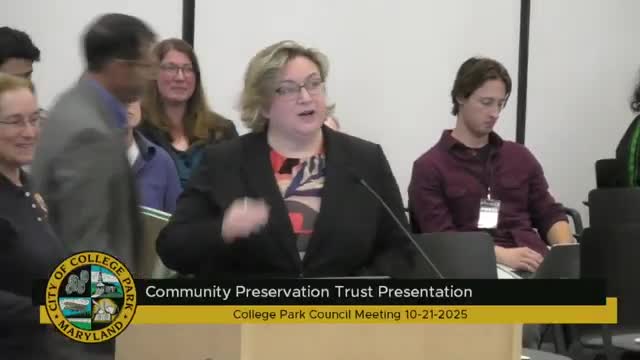College Park partners with Habitat, UMD students to rebuild Lakeland lot as permanently affordable home
Get AI-powered insights, summaries, and transcripts
Subscribe
Summary
City officials, the Community Preservation Trust and Habitat for Humanity previewed a plan to build a permanently affordable owner‑occupied home on a city‑owned lot at 5021 Lakeland Road, using a 99‑year covenant and student design input.
College Park officials and nonprofit partners on Tuesday described a pilot project to convert a vacant city lot at 5021 Lakeland Road into a permanently affordable, owner‑occupied home designed with University of Maryland capstone students and built with Habitat for Humanity.
The presentation to the College Park City Council laid out a multi‑partner plan in which the city would sell the lot to the Community Preservation Trust, the trust would place a long‑term affordability covenant on the land, and Habitat for Humanity would develop the home and sell it to a qualifying buyer using subsidies and a 0% interest mortgage.
“Today, that vision is what we bring,” Orlando Velez, director of operations and housing initiatives at the City‑University Partnership, told the council. “The project brings the site back to life as a new, permanent, affordable, owner occupied project.”
The partners said the project would be community‑driven: UMD architecture and engineering capstone students will work with Lakeland residents and the Lakeland Civic Association in design charrettes; Habitat will contribute construction expertise and the buyer will provide sweat equity. The trust’s ownership of the land and a 99‑year covenant would preserve affordability across future sales, the presenters said.
Kate Kennedy, chair of the Community Preservation Trust and a former council member, framed the plan as a proof‑of‑concept for using small, city‑owned vacant parcels to expand long‑term affordable homeownership. “We talked about partnerships with other organizations like Habitat for Humanity and other groups to come in and really leverage the work we were already doing,” Kennedy said.
Project details still must be worked out. Presenters said they were proposing a $200,000 acquisition package so Habitat could use available Community Development Block Grant (CDBG) funds for land acquisition; city staff later clarified the city spent about $211,000 to acquire the site and that the partnership had worked backward from funding limits to reach a proposed purchase number. Presenters also noted state affordable‑housing legislation may allow nonprofit developers to build duplexes on lots zoned single‑family, which could expand unit options if the community supports it.
Orlando Velez said the team had not yet asked the council for final approval to sell the property to the trust; the presentation was a request for comment and community feedback. Council members and community representatives discussed zoning, the possibility of a duplex, timelines tied to the capstone academic year and permitting, and options such as modular construction and energy‑efficient building strategies.
“Because the home was developed on land owned by the trust, the trust agreement, the 99‑year covenant, will stay with the land, ensuring that each future buyer meets income requirements and lives in the home as their permanent residence,” Velez said, describing the intended long‑term protection of affordability.
Council members from District 2 and others praised the proposal and asked for follow‑up details on timeline, parking and construction approach. Staff indicated design work with students would occur this academic year and that construction could begin late next year if permitting and funding align.
The project team asked the council for continued feedback and signaled they would return with formal requests—including a sale agreement and property‑use details—if the council supported moving forward.
Ending: The council did not take a vote Tuesday; the presentation served to gather council and community input. Project leads said they will return with agreements and permitting details after design and funding questions are resolved.
